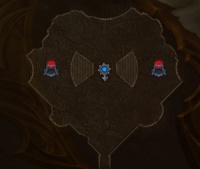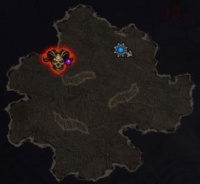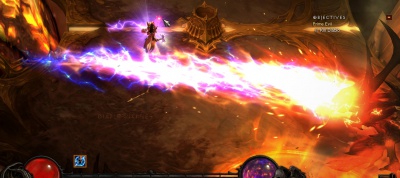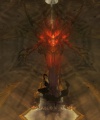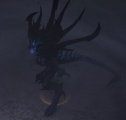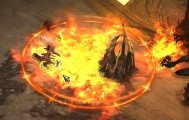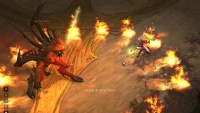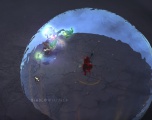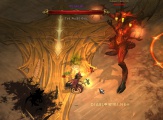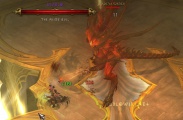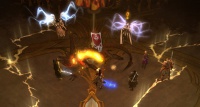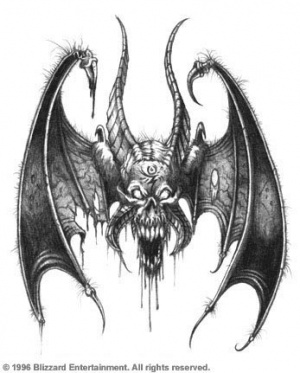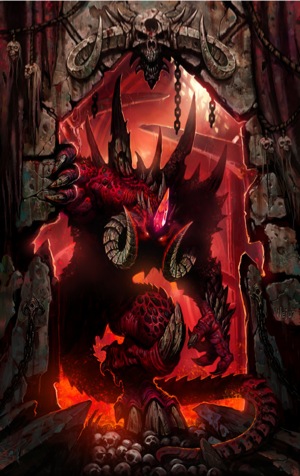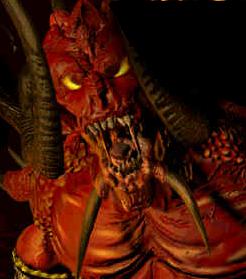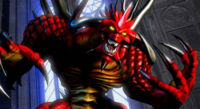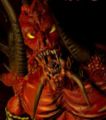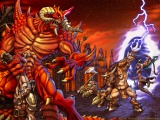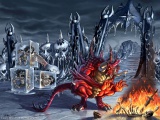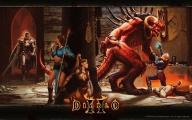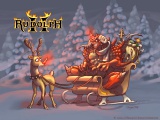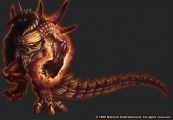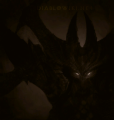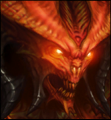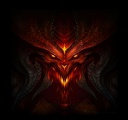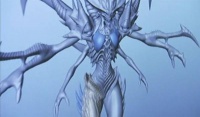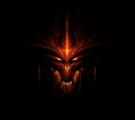Diablo
Diablo, The Lord of Terror, is the primary antagonist in the Diablo video game series developed by Blizzard Entertainment. He is the final boss in the first Diablo game, and the final boss in Diablo II prior to the release of the expansion pack. Along with his older brothers, Baal and Mephisto, Diablo is one of the three Prime Evils.
Disambiguation:
- Diablo II
- Diablo I
- Diablo's stats (Diablo I and Hellfire)
- Diablo (Quest)
| Diablo Character [e] | |
|---|---|
 | |
| Diablo Lord of Terror | |
| Gender: | Male (presumed) |
| Race: | Demon |
| Status: | Alive (presumed) |
| Occupation: | Prime Evil |
| Affilliation: | Burning Hells |
| Friends: | Baal, Mephisto |
| Foes: | Imperius, Tyrael |
| Location: | Crystal Arch |
Contents
Diablo Appearances
Diablo III
Diablo appears very late in the game in D3, not poking its head out until Act IV. Big Red's appearance has changed to a more lithe, menacing form than that seen in bulkier, spikier iterations.
It is not entirely correct to say that this is a boss battle with Diablo, as due to events in the game, Diablo has taken on the form of the Prime Evil, who bears the traits of every greater and lesser evil that was trapped within the Black Soulstone. Diablo, in Diablo III, will be referred to as "it" as it appears to be gender-neutral, or at least gender confused. Diablo is still referred to as "he" by NPCs in the game.
Diablo, like Azmodan, is quite chatty in Diablo III, often appearing as an ominous voice from a location unknown, taunting the player, and telling them they will fail at doing exactly what it is they are doing at the time.
Boss Abilities
Diablo's boss fight in the Crystal Arch is a three-phase battle. The player is lucky, as they have just been awarded an all-inclusive vacation getaway to a world of pain.
Phase 1
Diablo will not waste much time after the cut-scene ends, and immediately gets to work on grinding down the hero. In the Crystal Arch arena, there are health wells at the east and the west sides, which are on a 30-second respawn timer. The health wells are only present in Phase 1 and Phase 3.
Phase 1 abilities are as follows:
- Claw Rip - A basic melee attack where Diablo swipes at the hero. The melee swipe can inflict various curses on the player, covered below.
- Charge - In a burst of speed, Diablo will quickly sprint to the hero and strike.
- Hell Spikes - Diablo raises its arms, creating shadows on the ground that will erupt in bony protrusions, caging the hero. If the hero is caged, Diablo moves on to the next ability.
- Shadow Vanish Grab - It will vanish and appear before the hell spike cage, grabbing the hero and pulling them into the air, bellowing in the hero's face for damage. This attack, if successful against the player, inflicts the Curse of Destruction.
- Curse of Destruction - The player and nearby allies will suffer from ticking damage over time, until the curse expires, at which time it detonates, doing small damage to any friendly player or minion in range.
- Ring of Fire - Diablo will shoot a fireball at the player, and when it lands on the ground, it creates a medium-sized circle of flame ringed in runes. The fire causes a debuff if the player is standing in it, which will cause the hero to take fire damage over time. At the end of the curse, the player will have an explosion move outwards from them, damaging any parting members or minions in range of the blast.
- Ground Stomp - Diablo will stomp on the ground, sending out large fireballs in all directions. This ability operates very similarly to the Immolation spell from Diablo I.
- Curse of Anguish - Damage taken is increased, and health regeneration is decreased. This decrease in healing applies to all healing effects, including potions.
- Curse of Hatred - Damage taken is increased, and damage done is increased as well. This is similar to the Glass Cannon passive from the Wizard.
Phase 2
The terror phase is initiated when Diablo reaches fifty percent health in phase 1. The player is transported to a different arena where the fight changes dynamic. There Diablo takes an ethereal aspect, called Shadow of Diablo, that has all of the abilities from phase 1, with an additional ability that only appears in phase 2:
- Shadow Clone - Diablo will disappear and summon a shadow clone of the hero's class. The shadow clone doesn't necessarily use the skillset that the hero has. An example would be that a Wizard without Arcane Orb may fight a shadow clone Wizard who does fire off arcane orbs. The shadow clones drop small health globes. Shadow clones have access to runed abilities.
The shadows that denote where a hell spike cage will spawn are much more difficult to see on this dark background.
Phase 3
The final phase is similar to Phase one, with two new abilities:
- Overdrive - This is a buff Diablo gains in the third phase where it is able to cast its spells and abilities at a much more frequent rate. It isn't uncommon to have Diablo able to cast overlapping Rings of Fire. Diablo's movement and attack speed is also increased.
- Lightning Breath - The feared "lightning hose" attack from Diablo II returns in buffed form. Diablo will cast this periodically in Phase 3, spraying out fiery-lightning from its mouth. This attack targets a specific enemy and as most players run away from it by circling around Diablo, the spray tends move around in an 180 degree arc. This attack does very high damage if it hits.
Associated Achievements
Diablo is in some way involved in the following achievement(s).
| Name | Points | Description | Banner |
|---|
Post Release Changes
Diablo was modified slightly in the v1.0.4 patch.[1]
- Diablo’s Bone Cage debuff will now be properly removed from the player during a phase transition if the cut-scene is skipped.
- Fixed an issue where triggering a phase transition while grasped by Diablo could cause both the player and Diablo to become temporarily invisible.
- Fixed an issue that caused Diablo to not summon [[Shadow Clones]] of the player if [[Seven-Sided Strike]] was cast at the appropriate time.
Gallery
Diablo in-game in Diablo III.
Diablo gets bannerfied by a victorious Wizard.
Background and Lore
Diablo ruled the Burning Hells together with his two elder brothers, Baal and Mephisto for aeons. They were locked in an eternal war with the High Heavens, and as always, hell had its own power struggles, primarily between the three Prime Evils, and the four Lesser Evils.
When the Archangel Inarius and the powerful demoness Lilith grew tired of this eternal war, they decided to create a refuge from it all, a Sanctuary. They, and other Demons and Angels, had children on Sanctuary, whom were neither demon nor angel, and significantly more powerful than either. These children were called the Nephalem, and Diablo found great interest in their lives.
The war with the heaven halted, seeing what would happen with Sanctuary. The High Heavens, with Tyrael and Imperius in the forefront wanted this "abomination" eradicated. Diablo saw potential in the massive powers of the nephalem, and the Sin War began. When Tyrael and the angels saw goodness in the humans, they were content to leave them to it, but the Worldstone would act as a dampener, making the nephalem less powerful, and became humans.
The Lesser Evils, too blinded by their hatred of Heaven, saw only the Prime Evils' meddling with Sanctuary as a distraction from the true war, and started a revolt in Hell. The Three were banished from Hell, and walked the earth of Sanctuary, spreading chaos in their wake.
Posing as Dialon, the Spirit of Determination, Diablo secretly led a group of religious fanatics in attempt to establish control over the realm. After the plan failed, Tyrael created the Soulstones and charged the Horadric Order with the imprisonment of the Prime Evils.
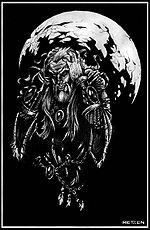
Diablo's soulstone was hidden underneath a Horadric monastery that later became Tristram. A few hundred years later, Diablo was strong enough to try and corrupt King Leoric. The Lord of Terror invaded Leoric's dreams, attempting to possess the King. Leoric was able to resist Diablo's presence, but he was driven mad by the ordeal.
Diablo had already drawn in Archbishop Lazarus, Leoric's most trusted adviser, and with Lazarus whispering into his ear, the mad king turned on his own people, executing those who disobeyed him, ordering his army into a suicidal war against the friendly neighbouring and previously allied kingdom of Westmarch, and finally purging most of the townspeople from Tristram when his son, Prince Albrecht, vanished. The horrible truth was that it was Lazarus himself who kidnapped the boy.
While Leoric was too strong for Diablo, Albrecht was not. The terror Albrecht felt in the tomb strengthened Diablo further, and he used Albrecht as his vessel. He inhabited the body and warped it in a demonic shape.
A hero travels through the Tristram labyrinths, catacombs, caves all the way down to Hell in order to confront Diablo directly and ultimately defeated him. The misguided hero drove Diablo's soulstone into his own forehead, hoping to contain the demon himself. He took it upon himself to bring the stone to the East and to imprison Diablo once more.
The Wanderer travelled the countryside, unleashing demons and horrors in his wake as he was slowly possessed by Diablo. Somehow, Diablo managed to bring the Lesser Evils back under his foot, and both Andariel and Duriel helped impair any attempt at catching up with Diablo's journey to release his brothers.
Surrendering control to the demon within, the Wanderer freed Baal and Mephisto, eventually travelling to Hell where he completed the transformation into his true demonic form.
He was, however once again followed to Hell, where the pursuing heroes unlocked five seals to summon him in his Chaos Sanctuary. After defeating Diablo the heroes destroyed his soulstone, banishing him from Sanctuary back to the Burning Hells.
If this was a permanent death of Diablo or not is unknown, but such an evil rarely dies easily.
Friends
Diablo's two older brothers:
Diablo's favoured servant or pet is the spider demon Astrogha.
Diablo II
The opening cinematic of Diablo II introduces us to the Dark Wanderer, the warrior who defeated Diablo underneath Tristram and is now pursued by a group of heroes. The Wanderer travels the countryside, unleashing demons and horrors in his wake as he is slowly possessed by Diablo. Surrendering control to the demon within, the Wanderer frees Baal and Mephisto, eventually travelling to Hell where he completes the transformation into his true demonic form. He is once again followed to Hell, where the pursuing heroes unlock five seals to summon him in his Chaos Sanctuary. After defeating Diablo the heroes destroy his Soulstone, banishing him from Sanctuary back to the Burning Hells.
Diablo I
The first encounter with Diablo occurs after a lone hero journeys deep beneath Tristram's Cathedral in search of a demonic presence plaguing the countryside. Diablo had nearly possessed the former ruler of Khanduras, King Leoric. Finding the king too strong willed to dominate completely, Diablo instead possessed his son, Prince Albrecht. The hero takes a portal directly to Hell in order to confront Diablo directly, ultimately defeating him. The misguided hero drove Diablo's soulstone into his own forehead, hoping to contain the demon himself.
Novels
Diablo has appeared or been referenced in the following novels:
- Diablo: Legacy of Blood
- Diablo: The Black Road
- Diablo: The Kingdom of Shadow
- Diablo: Demonsbane
- Diablo: Moon of the Spider
- Diablo: The Sin War trilogy:
Media
You can find pictures in the Diablo 3 screenshot and picture gallery:
Diablo in Diablo III
D3 Diablo portrait by Glowei
Diablo in Diablo II
Diablo in Diablo I
Diablo vs WoW humorous crossover
Diablo made by Samwise
The three Prime Evils
The Dark Wanderer turning into Diablo
Portrait by Glowei.
Reference
- Diablo is Returning
- Diablo I Manual
- Diablo II Manual
- Diablo II: Lord of Destruction Manual
- Diablo: Legacy of Blood
- Diablo: The Black Road
- Diablo: The Kingdom of Shadow
- Diablo: Demonsbane
- Diablo: Moon of the Spider
- Diablo: The Sin War
| Monsters of Diablo III[e] Beasts Beasts: Superunique Demons Demons: Superunique Humans Humans: Superunique Undead Undead: Superunique Objects Bosses Boss Mods Monster Info Fanmade |
|---|
| Beasts | Bat - Beast - Blood Hawk - Demonic Hellflyer - Electric Eel - Khazra - Lacuni - Lamprey - Quill Fiend - Rockworm - Sand Monster - Sand Shark - Sand Wasp - Scavenger - Spider - Spiderling - Swarm - Withermoth - Wood Wraith - |
|---|
| Demons |
Armored Destroyer - Dark Berserker - Deceiver - Fallen - Ghoul - Hellion - Thrall |
|---|
| Undead |
Accursed - Bone Reaver - Brigand - Dune Dervish - Ghost - Ghoul - Grotesque - Morlu Caster - Risen Dead - Skeleton - Skeleton Mage - Unburied - Wraith - Wretched Mother |
|---|
| Primary Quest Uniques |
Act One Bosses:
Araneae -
Skeleton King -
The Warden -
The Butcher
|
|---|
|
| |||||
|---|---|---|---|---|---|
| Uniques Modifiers |
Strong CC (Limit 1): Knockback -- Nightmarish -- Vortex -- Jailer | ||||
| Removed Modifiers |
| ||||
|
| |||||
| Act One Uniques | Araneae - Web Spit | Leoric - Summon Skeleton, Teleport Strike, Triple Cleave | The Butcher - Smash, Grappling Hook, Spear, Frenzy Charge | ||
| Act Two Uniques | Maghda - Forcefield, Summoning Ritual, Punish, Moth Dust, Teleport. | Zoltan Kulle - Fiery Boulder, Time Bubble, Ceiling Collapse, Energy Twister,Vanish, Creepy Laugh | Belial - Phase One: Triple Fireball, Summon Vipers. Phase Two: Poison Meteors, Ground Pound, Lightning Strike, Lightning Breath. | ||
| Act Three Uniques | Ghom - Acid Slime, Sneeze, Gas Cloud, Chomp. | Siegebreaker - Triple Hit, Charge, Leg Stomp, Grab and Throw. | Cydaea - Pain Bolts, Web Trap, Spider Pits. | Azmodan - Bellyflop, Laser Attack, Falling Corpses, Demon Gate, Pool of Destruction, Globe of Annihilation. | |
| Act Four Uniques | Rakanoth - Cleave, Teleport Strike, Blade Strike, Volley, Summon Minion. | Izual - Frost Nova, Frozen, Summon Minions. | Diablo - Phase One: Claw Rip, Charge, Hell Spikes, Shadow Vanish Grab, Curse of Destruction, Ring of Fire, Ground Stomp, Curse of Anguish, Curse of Hatred. Phase Two: Shadow Clone. Phase Three: Overdrive, Lightning Breath. | ||
| Monster Info |
Monsters Basics -
Bosses -
Boss Modifiers -
Champions -
Quest bosses -
Teeth of Diablo -
Fan-made monsters
|
|---|
| Characters & NPCs[e] Import. Chars Rumoured Diablo 3 NPCs Diablo 2 NPCs Diablo 1 NPCs Minor A-K Minor L-Z Fanmade |
|---|
| Important Characters |
Angiris Council Lords of Hell |
Horadrim Miscellaneous |
Miscellaneous (cont) |
Miscellaneous (cont) |
Miscellaneous (cont) |
|---|
| Diablo III's Possible NPCs |
Franklin Burroughs - Humbart Wessel - Pablo DeSoto - Quov Tsin - Kentril Dumon - Zayl |
|---|
| NPCs of Diablo II |
Act I:
Akara -
Charsi -
Chickens -
Deckard Cain -
Flavie -
Gheed -
Kashya -
Rogue NPCs -
Warriv
|
|---|
| NPCs of Diablo I |
Diablo NPCs:
Adria -
Cain -
Cows -
Farnham -
Gillian -
Griswold -
Kael Rills -
Ogden -
Pepin -
Wirt
|
|---|
| Minor A-K |
Achilios - Adria - Akara - Albord - Aldric Jitan - Alkor - Anya - Arkaine - Asheara - Assur - Atma - Augustus Malevolyn - Baerna - Banagar - Benjin - Brek - Buyard Cholik - Camylle - Celestia - Cornelius - Darrick Lang - Diomedes - Drognan - Edgewulf - Elora - Elzix - Emilye - Fara - Farnham - Fautzin - Galeona - Garda - Gheed - Gillian - Gorst - Greiz - Griswold - Guthwulf - Hagan - Halbu - Hanos Jeronnan - Hargo - Hays - Hratli - Hrothwulf - Humbart Wessel - Hunfrith - Hyram - Icharion - Jace - Jamella - Jerhyn - Jodas - Juris Khan - Justinian IV - Kabraxis - Kara Nightshadow - Karybdus - Kashya - Kentril Dumon - Kethryes - Korlic - Kreghn - Ku Y'leh |
|---|
| Minor L-Z |
Lam Esen - Larzuk - Linarian - Lysander - Malah - Mat Hu-Ring - Meshif - Mirakodus - Mordecai - Natalya - Nefriti - Nellia - Nihlathak - Nor Tiraj - Norrec Vizharan - Ogden - Ord Rekar - Orlif - Ormus - Oskal - Palashia - Pepin - Qarak - Qual-Kehk - Riordan Nesardo - Sadun Tryst - Salene Nesardo - Sardak - Sarnakyle - Septumos - Simon - Talic - Taramis Volken - Tilgar - Tobio - Toko - Tylwulf - Vischar Orous - Warriv - Wirt - Wulfgar - Xazax - Zagraal - Zayl - Zorea |
|---|
